
Calibration—
Type
3B5
(A)
I
■
(B)
Fig.
6-25. (A) Location of TP664, Logic Card, (B) Typical test
oscilloscope
display showing nominal CYCLES/SWEEP adjustment,
(C)
Location of CYCLES/SWEEP adjustment (front-panel).
nine
divisions
in
duration
(one
second
to
1.8
seconds;
see
Fig.
6-24B)
and
about
1.6
divisions in
amplitude
(approximately
eight volts).
d. Change
the
test
oscilloscope
sweep
rate
to 0.5
second/
division.
e. Hold
the SEEK
button
depressed.
f. CHECK
—
Test
oscilloscope
display
for
a
waveform
period
of
two
to four
divisions
(one
to
two
seconds;
see
Fig.
6-24C).
24.
Adjust
Cycles/Sweep
O
a.
Remove
the
Logic
Card
and
re-install
it
using
the
cir
cuit-card extender
(turn
off
indicator oscilloscope
power
while
installing
extender).
b. Connect
the
10X
probe
tip
to
TP664
(Logic
Card; see
Fig.
6-25A).
c.
Set
the
test
oscilloscope
for
a
vertical deflection
of
0.1
volt/division
(1
volt/division
including
probe),
sweep
rate
of
one
millisecond/division
and
set the
trigger slope
to
trigger
on
the
negative
slope.
d. Press
the
MAN
button.
e. CHECK
—
Test
oscilloscope display
for
a
1.8-division
window-gate
signal (see
Fig.
6-25B).
f.
ADJUST
—
CYCLES/SWEEP
adjustment,
R650
(see
Fig.
6-25C),
so
the window-gate signal is
1.8
divisions
in
length.
NOTE
This
procedure
provides
a
nominal
range
of
opera
tion
for
a
typical
Seek
Mode
display
of between
two
and
six
cycles;
the
exact
number
of
cycles
dis
played
for a
particular
signal
will
vary
due
to
the
sweep
rate
selected
by
the
Seek
circuit.
This
adjust
ment
can
be
reset
for
the
desired
range
during
normal
use.
g. Remove the
circuit-card
extender
and
the
plug-in
extender.
Re-install
the
Logic Card
and
insert
the
Type
3B5
into
the
right
plug-in compartment.
Set
the
indicator
oscilo-
scope
upright.
h.
Disconnect
the
time-mark
generator.
25.
Check
Seek
Mode Operation
a. Connect
the
remote-seeking
probe
to
the
automatic/
programmable
amplifier
unit
input connector.
b.
Connect
the
probe
tip to
the
indicator oscilloscope
cali
brator
output
connector.
c.
Press
the
seek
button
on
the
remote-seeking
probe.
d.
CHECK
—
Both
the
amplifier
unit
and
the
Type
3B5
seek
a
stable
CRT
display
showing
between
two
and six
cycles
6-24
Summary of Contents for 3B5
Page 4: ...Fig 1 1 Type 3B5 Automatic Programmable Time Base unit Type 3B5...
Page 15: ...Operating Instructions Type 3B5 TYPE 3B5 CONTROL SET UP CHART Fig 2 2 Control set up chart 2 7...
Page 48: ...CO I o Fig 3 13 Delay and Timing Circuit logic block diagram Circuit Description Type 3B5...
Page 61: ...GO i GO GO Fig 3 22 Seek Ciicuit Logic block diagram Circuit Description Type 3B5...
Page 70: ...u k KJ Fig 3 29 Circuit conditions for Manual Mode operation Circuit Description Type 3B5...
Page 71: ...w K w Fig 3 30 Circuit conditions for Seek Mode operation Circuit Description Type 3B5...
Page 72: ...w I u U Fig 3 31 Circuit condition for External Mode operation Circuit Description Type 3B5...
Page 88: ...Maintenance Type 3B5 Fig 4 9 Location of components on Logic Card 4 14...
Page 89: ...u Oi Fig 4 10 Location of components on Counter Card Maintenance Type 3B5...
Page 92: ...NOTES I...
Page 104: ...NOTES...
Page 106: ...Calibration Type 3B5 Fig 6 1 Recommended calibration equipment...
Page 160: ......
Page 176: ...J400 RtADOUT BOARD 3B5 PLUG IN A READOUT...
Page 182: ...397 R E A D O U T B O A R D 10 6b READOUT BOARD...
Page 184: ...FIG 1 FRONT SWITCHES TYPE 3B5 AUTOMATIC PROGRAMMABLE TIME BASE...
Page 185: ...FIG 2 CHASSIS REAR 3 GS to TYPE 3B5 AUTOMATIC PROGRAMMABLE TIME BASE...
Page 186: ...OPTIONAL ACCESSORIES...
















































